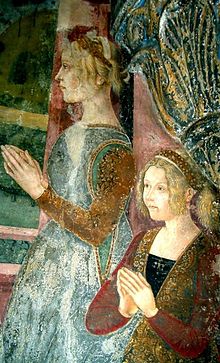William VIII, Marquis of Montferrat
William VIII, Marquis of Montferrat | |
|---|---|
 | |
| Marquis of Montferrat | |
| Reign | 1464–1483 |
| Predecessor | John IV Palaiologos |
| Successor | Boniface III Palaiologos |
| Born | 19 July 1420 Casale Monferrato |
| Died | 27 February 1483 (aged 62) Casale Monferrato |
| Noble family | Palaeologus-Montferrat |
| Spouse(s) | Marie de Foix Elisabetta Sforza Bernarde de Brosse |
| Issue | Giovanna Blanche of Montferrat |
| Father | John Jacob, Marquis of Montferrat |
| Mother | Joanna of Savoy |
William VIII Palaiologos (Italian: Guglielmo VIII Paleologo; 19 July 1420 – 27 February 1483) was the Marquis of Montferrat from 1464 until his death.
He was the second son of Marquis John Jacob[1] and Joanna of Savoy, daughter of Amadeus VI of Savoy.
William inherited the Marquisate after the death of his elder brother John IV. He obtained, by Emperor Frederick III, the territories lost to Savoy from 1435. William served as condottiero for Francesco I Sforza of Milan and fought alongside him at the battle of Caravaggio(1448) and was afterwards rewarded with the lordship of Alessandria.
In 1449, William was accused of treachery and imprisoned by Francesco Sforza. The reason was said to because he had formed an attachment to Sforza's wife Bianca Maria Visconti.[2] He was released a year later. Angry over his treatment by Sforza, William encouraged his brother John IV of Montferrat and relative Louis of Savoy to make war on Sforza (and Milan), and then he himself would lead the troops in battle. This attempt failed.
William later became a tutor to the couple's son Galeazzo Maria. Following his assassination, William held several positions in the Duchy of Milan.
Marriage
[edit]William married on 19 January 1465, Marie de Foix (d.1467), daughter of Gaston IV, Count of Foix;[3] and secondly on 18 July 1469, Elisabetta Sforza (d.1473),[4] daughter of Francesco I Duke of Milan and Bianca Maria Visconti;[5] and finally, on 6 January 1474, Bernarde de Brosse daughter of Jean II de Brosse.[6]
His second marriage to Elisabetta Sforza, they had:
- Giovanna, married to Ludovico II del Vasto, Marquis of Saluzzo
- Blanche of Montferrat, married to Charles I, Duke of Savoy[4]
When William died in Casale Monferrato, he was succeeded by his brother Boniface III.
References
[edit]- ^ Soler 2017, p. 829.
- ^ Gregory 1940, p. 152.
- ^ Woodacre 2013, p. xxi.
- ^ a b Denieul-Cormier 1968, p. 37.
- ^ Lubkin 1994, Figure 2.
- ^ Cereia 2018, p. 229.
Sources
[edit]- Cereia, Daniela (2018). "Femmes a la cour de Marguerite de Broubon (1438-1483) et Claude de Brosse, comtesses de Bresse (1471-1497)". In zum Kolk, Caroline; Wilson-Chevalier, Kathleen (eds.). Femmes à la cour de France: Charges et fonctions (XVe - XIXe siècle) (in French). Presses Universitaires Septentrion. pp. 227–238.
- Denieul-Cormier, Anne (1968). A Time of Glory: The Renaissance in France, 1488-1559. Doubleday.
- Gregory, Winifred Terni de (1940). Bianca Maria Visconti, duchessa di Milano (in Italian). Istituto Italiano d'Arti Grafiche.
- Lubkin, Gregory (1994). A Renaissance Court: Milan under Galleazzo Maria Sforza. University of California Press.
- Soler, Abel (2017). L’Europa cavalleresca i la ficció literària: La cort napolitana d’Alfons el Magnanim: el context de Curial e Guelfa (in Spanish). Vol. III. Publicacions de la Universitat de Valencia.
- Woodacre, Elena (2013). The Queens Regnant of Navarre: Succession, Politics, and Partnership, 1274-1512. Palgrave Macmillan.
